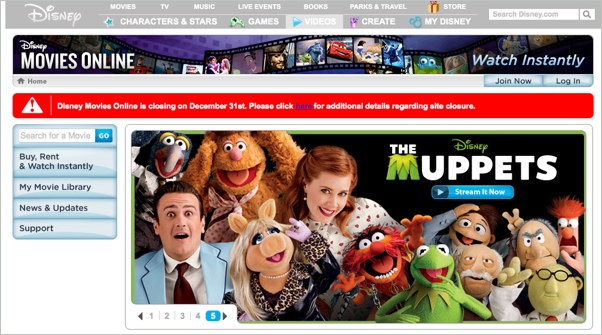-
Disney Online Movies' Demise Is Another Blow for Transactional VOD and Digital Lockers
Disney's announcement that it was shutting down its Disney Movies Online service on Dec. 31 is another blow for transactional VOD and digital lockers for movies, two corners of the online video ecosystem that are struggling for traction.
Transactional VOD - renting or buying movies online - has become a tougher sell to consumers in the digital age. Not long ago Hollywood studios' home video divisions boomed as many consumers were keen to buy DVDs and create large collections of movies that they prominently displayed. But while DVD sales have gone off the cliff recently, digital rentals and purchases haven't picked up the slack.The reason is that cheap subscription alternatives like Netflix for older movies and physical rental options like Redbox for newer ones have become very attractive, reflecting a shift in mind-set among consumers, no doubt exacerbated by the recession. Consumers seem to be saying it's not as important to invest in expensive permanent ownership when inexpensive rental options exist. Given that Netflix offers unlimited viewing and Redbox $1.20 rentals, the idea of buying a movie for $15-$30, or even renting for $4-$5 seems a lot less appealing (and that's before considering the quality of the movies themselves).
A few months ago, IHS Screen Digest quantified the shift that's occurred over the last couple of years, noting that Netflix has moved up to 44% of the online movie market, while the biggest transactional player, iTunes, has seen its share fall to 32.3%. The total size of the transactional VOD market for rentals and purchases is pegged at about $500 million in 2011, relatively small change for Hollywood.
Lack of consumer interest in ownership jeopardizes digital lockers, another of Hollywood's strategic priorities. With the UltraViolet initiative, Hollywood is hoping that consumers will see renewed value in physical ownership if given the additional value of streaming rights on multiple devices from the cloud. This assumes however, that consumers actually want to watch movies multiple times and in multiple settings, and that all these ownership benefits are worth the $15-$30 prices prevalent for discs.
Admittedly, Disney Movies Online was far from perfect since it didn't offer a downloading option and movies could only be viewed via browsers, not on connected devices. So its failure can't be seen as a fatal blow for transactional VOD or digital lockers. It also had the handicap of relatively narrow selection, as compared with aggregators.
Still, with its stable of children's classics, Disney was in the best position of any studio to succeed. As such, the lack of consumer interest in Disney Movies Online should be a red flag for Hollywood, struggling for how to adapt to consumers' new expectations in the digital era.Categories: Commerce, FIlms, Studios, Video On Demand
Topics: Disney


